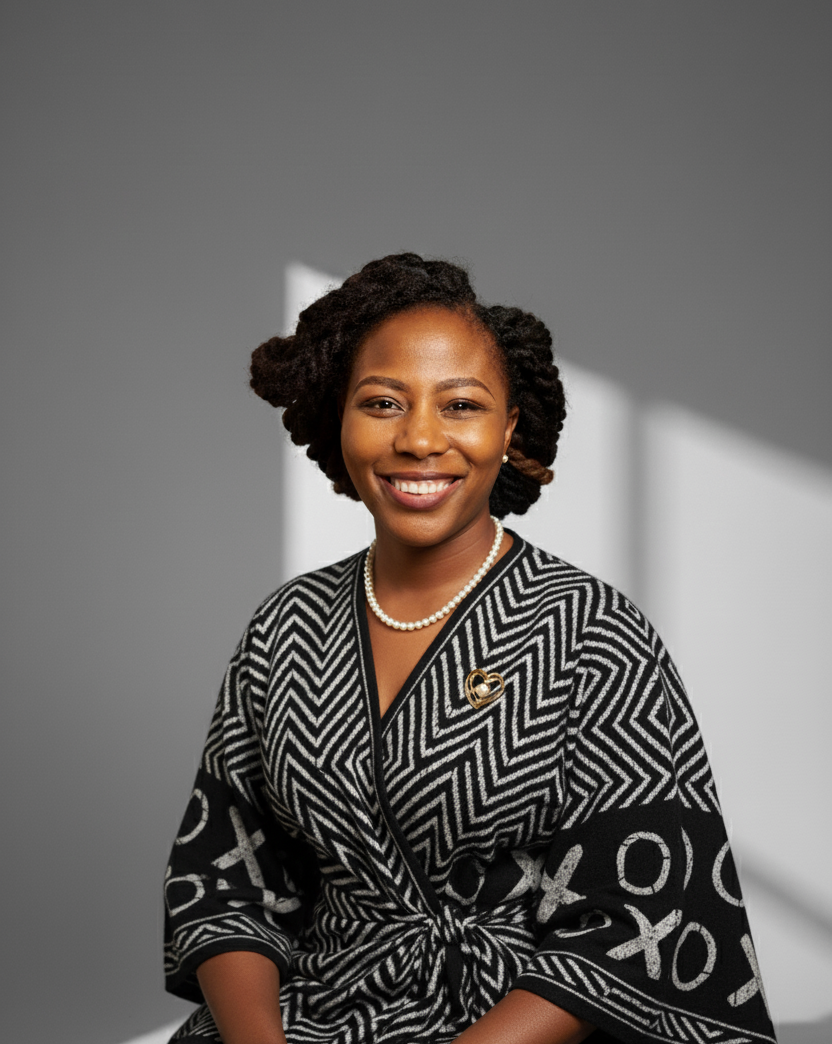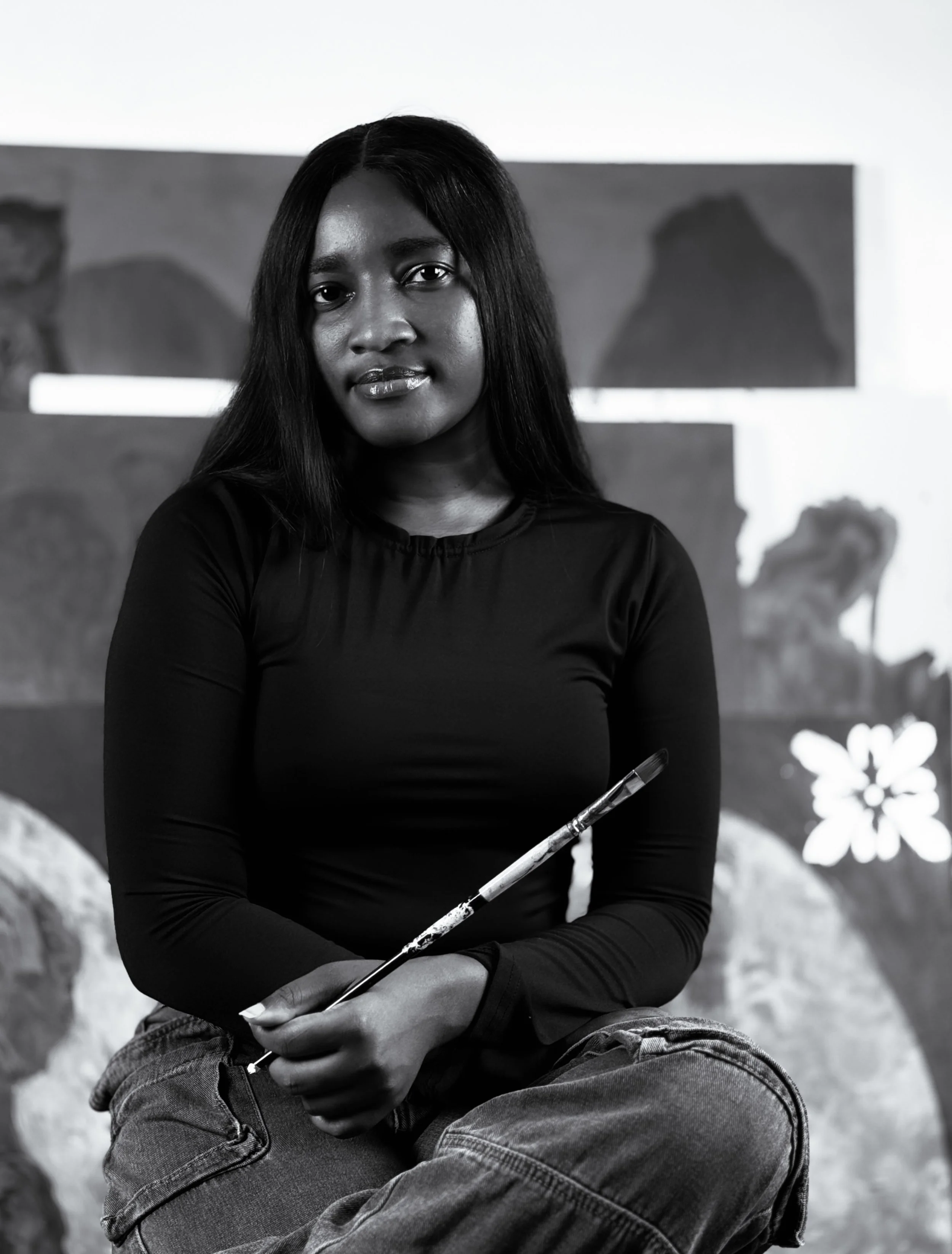Our artists
Marcellina Akpojotor
“The Ronke Ekwensi Fellowship was a transformative experience [that gave me a] renewed confidence, determination and a profound sense of gratitude that continues to fuel my artistic journey.”
Marcellina Akpojotor (b. 1989, Lagos, Nigeria) combines collage and painting to explore femininity, personal and societal identity, familial history and women's empowerment. She works with discarded Ankara fabric - sourced from local fashion houses- commonly known as the “African print fabric” despite its Dutch origin.She investigates the politics of the fabric as a cultural signifier and a conduit for memory and shared energy.
Akpojotor studied at Lagos State Polytechnic and Obafemi Awolowo University after apprenticing with her father. Her exhibitions include solo shows at Rele Gallery (Lagos, 2018; Los Angeles, 2021; London, 2023) and group shows worldwide. She has participated in prominent art fairs across the world including Art Basel Miami Beach (2021). She has been featured on BBC, CNN, The New York Times, Financial Times among others.
She was awarded the Ronke Ekwensi Fellowship in 2017 following her profile in the publication “The Art of Nigerian Women” by Ben Bosah. She was a Norval Sovereign African Art Prize finalist (2025) and was awarded the Civitella Ranieri Residency Fellowship in Italy (2025).
Folasade ‘SHade’ Adebowale
“The fellowship not only enriched my craft but also strengthened my purpose as an artist. It gave me the space, mentorship, and community I needed to refine my voice and explore new dimensions of creative expression.”
Born on May 24, 1991, Sade Adebowale is a Nigerian painter and the daughter of an artist. She earned her Bachelor’s Degree in Fine Arts (Painting) from Tai Solarin University of Education in 2010 and her master’s Degree at Ladoke Akintola University of Technology.
Inspired by great masters, through her bold, textured works featuring melanin-skinned figures, Sade redefines beauty, resilience, and identity while challenging viewers to see beyond traditional boundaries.Her work, rich in cultural expression and emotion, has been exhibited in Nigeria, Belgium, and the USA, including shows such as Africa4Her (2016), Her Story (2018), and Facial Marks (City College of New York).
Sade’s art reflects her belief in creativity without limits and celebrates African identity through powerful depictions of women and everyday life.
Uchay Joel Chima
“[The] Ronke Ekwensi Fellowship served as a springboard to launch me to a level of exposure to the art environment in the States. It also helped some art collectors to get to know and show support to an upcoming artist at that time.”
Uchay Joel Chima (Born 1971) graduated in 1997 from the Art School of the Institute of Management and Technology in Enugu, Nigeria, and since has exhibited works in prominent galleries and Museums in the United States, Nigeria, South Africa, Canada, Sweden, Germany, the Netherlands, and the United Kingdom.
Working with reclaimed and organic materials, Uchay’s practice has long been committed to ecology, not only in the environmental sense but as an ethos of survival, adaptation, and continuity. Charcoal, ropes, strings, and discarded remnants become vessels through which he charts cycles of transformation.
These materials, often marked by fire, use, or abandonment, embody the very tension of time: what is consumed and what remains.
Atinuke Macaulay-Layinde
“[The] Ronke Ekwensi Fellowship has given me the confidence to trust my creative voice and the value of my perspective. My artistic horizons has been expanded, pushing me to experiment with new ideas, materials, and methods.”
Atinuke’s work explores the intertwined themes of family, memory, and society through the fluidity of acrylic pouring. Growing up in a large extended family in Lagos, Nigeria rooted in the traditions of polygamy, I witnessed the beauty and complexity of human connection, shared stories, unspoken emotions, and the ever-shifting roles within communal life.
These lived experiences flow into my paintings, where color and movement become metaphors for the rhythms, tensions, and tenderness that shape our collective and personal histories.



